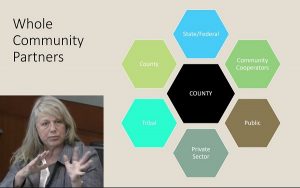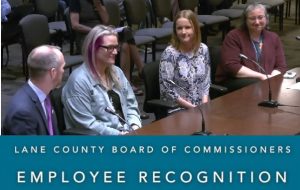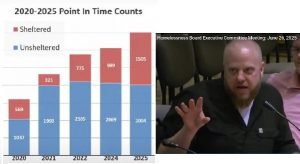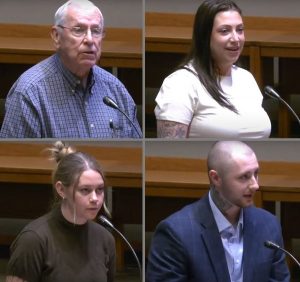Nightingale welcomes neighbors during site tour
9 min read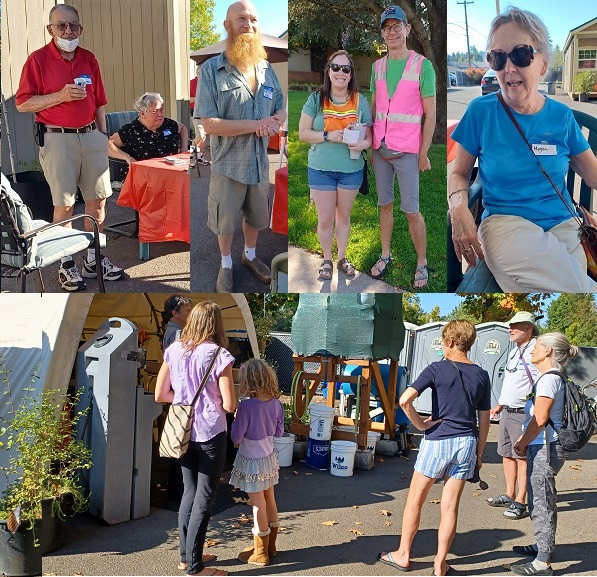
One of Eugene’s very first rest stops welcomed neighbors for a tour. At 34th and Hilyard, Nightingale Hosted Shelters offers 20 Conestoga huts, a field kitchen, water tank, and even a garden. On Oct. 7:
[00:00:15] Bruce Abel (Nightingale Hosted Shelters, board member): Welcome. Thank you for coming to the tour. We’re going to introduce you to what we have here.
[00:00:21] John Q: Bruce led the tour with Nightingale resident Michael, and many other board members were there. Past president and acting treasurer, Megan O’Connor:
[00:00:29] Megan O’Connor (Nightingale Supported Shelters): Nightingale and Community Supported Shelter were the two entities that the city of Eugene asked to pilot the rest stop program. And the city of Eugene website has some really nice history on that project and piloting it and the work that both CSS and Nightingale did to look at what our homeless neighbors needed and wanted and expected of their community. And so we’ve been here ever since.
[00:00:56] We are now at capacity and 20 Conestoga units, 20 is about capacity for a shelter. And you can look at all kinds of studies if you want on that, starting with the military, back to Genghis Khan, about why you put people in groups of 20. It has to do with math and all kinds of things. But it is a group that is supported. And you can do all kinds of things where people feel safe and can find like-minded to work with. And we found that here.
[00:01:25] Conestoga huts support one person. They’re really not big enough for a couple. We, as of today, do not have power, water, or sewer. We hope to have that in the future. We havem waiting to be establishedm a kitchen that will replace our MASH (Mobile Army Surgical Hospital) kitchen.
[00:01:49] Bruce Abel (Nightingale Hosted Shelters, board member): This is the future kitchen, where supposedly we are getting water and electricity here, sewage, and within a year we will have the kitchen fully functional. We have stoves and refrigerators. This will be moved down to that end of camp when we get the water and electricity.
[00:02:15] Michael: We’re all looking forward to the new kitchen. We’ve got a big tent kitchen down here. This has already got state-of-the-art, brand-new freezer, refrigerator, stove, running water, everything. So I’m really excited about the move. There’s a lot coming next year, showers, bathrooms, electricity, full-time kitchen, living room. It’s pretty exciting.
[00:02:37] Neighborhood resident: How do you get electricity now?
[00:02:38] Michael: We run a generator every night, 4 p.m. to 9 p.m. and people charge their phones and tablets and cook and have dinners together and stuff like every night.
[00:02:47] Bruce Abel (Nightingale Hosted Shelters, board member): So if you’ll walk this way…So the nice thing about Nightingale is that compared to other shelters or hosted shelters, this one has much more of a sense of community. And there’s much more connection between people, and it does not have public funds, so we’re not governed by the rules and regulations if we were getting city funds.
[00:03:12] So we can work with people. We can select who’s most appropriate to fit in, rather than accepting people who are, for instance, meth users or something. We can screen out people that would not be a good match here. What’s this building, Michael?
[00:03:28] Michael: This is our community room, our television, all our charging stations. You can go on in. There’s some donations, clothing and things like that for people to grab whatever they want.
[00:03:38] Bruce Abel (Nightingale Hosted Shelters, board member): There’s community meetings every Monday afternoon or evening where everyone gets together, discusses community issues. In the winter, we meet in this little room. In the summer, we meet outside. And that’s a way of reducing tensions, talking about rules, and building relationships between people.
[00:03:59] Michael: And there’s our gate duty calendars. Where there’s two names, those are new people being trained by someone who’s already here.
[00:04:06] Bruce Abel (Nightingale Hosted Shelters, board member): And this is identical space to the kitchen area. So you can imagine that there’ll be nice kitchen stuff and dining room table.
[00:04:15] And here is the current kitchen. We have both one thing of drinking water and one thing of cleaning, hand-washing water. As you look in there, there’s stoves, there’s a refrigerator, there’s shared food, and there’s personal space for storage.
[00:04:33] Megan O’Connor: The MASH kitchen was established during COVID when all of the dining areas in the congregate meal sites that have been throughout Eugene were no longer available.
[00:04:44] They were closed due to COVID. And we had asked our residents to, if possible, stay here to be safe and protected. And so we, with the help of the community, were able to build a MASH kitchen. The Rotary stepped up and got us a kitchen, with local community businesses who gave us deep discounts.
[00:05:04] We got a generator. We had a gas-propelled stove, so we were able to cook and keep our folks here and keep our folks healthy. We did three different clinics during COVID: Volunteers in Medicine, White Bird, and Lane County Health Department all did clinics for our folks. And we had, thank goodness, only one case of COVID in camp the entire time. And that’s pretty astounding.
[00:05:37] Michael: Everyone’s favorite rule is wash your hands before going into the kitchen. (Mm-hmm.) Every time.
[00:05:45] Neighborhood resident: How often do you get meals delivered?
[00:05:47] Michael: Wendy and her husband were just here. They had a lasagna here Wednesday. She, they come every other Wednesday. They do pork loin, they’re asking us what we want… stir-fry, spaghetti. They’re taking menu ideas. And Joella comes every Monday for our Monday night meeting. We have hot dinner together and we’ll do—
[00:06:06] Neighborhood resident: Yeah. She’s a good friend of mine. I just found out she was doing that. It’s pretty phenomenal.
[00:06:11] Joella and Wendy are, like, encouraging and Red does it, the work parties every other Sunday. We’ll either do leaves and fall cleanup or we all get together and get all the cans recycled and turned in for money. But you know, cook us breakfast. And some of us are getting up, a guy cooked pancakes for everybody this morning. One of us just got up and did it.
[00:06:32] Bruce Abel (Nightingale Hosted Shelters, board member): You know, there’s no federal or city or state or county funding. It’s all fund-raise— between $80,000 and $90,000 every year the board has to fundraise. There’s a lot of people who come and donate their cans here. So that they’re weekly or monthly, there’s big cans which gives cash and people bring food and clothes and stuff. It’s really dependent.
[00:06:54] If you look right now, we’ve got port-a-potties, but there will be a shower and two toilets, two bathrooms. So we’re really looking forward to having hot water.
[00:07:07] So the kitchen will be here. The toilet, the shower will be here. Yes, Hazel?
[00:07:14] Hazel: This is where you get the food for the kitchen, right?
[00:07:17] Bruce Abel (Nightingale Hosted Shelters, board member): You know, there’s strawberries that grow here.
[00:07:20] Michael: Squashes. We all are talking about once everything’s settled, are we going to, can we make our own garden to grow tomatoes? And cucumbers and carrots and stuff. And berries. You can have the blackberries.
[00:07:32] Bruce Abel (Nightingale Hosted Shelters, board member): That was a very good question, Hazel. So this, this is a place where people can hang out and eat and this is a storage area.
[00:07:45] Michael: This is where our generator comes every night at 4 p.m., the gate duty person rolls this up and we finally roll it out of a storage hut. These two electrical cords give us everything we need at 4 p.m. to 9 p.m. every night, seven nights a week.
[00:08:03] Bruce Abel (Nightingale Hosted Shelters, board member): So we’re going to show you one of the huts. You need to know that this year, we got a donation to redo the huts. So the huts now have insulation, they have new floors, they were cleaned up, they were painted. So is this where people want to live? You know, it’s better than living in a tent outside. So it’s a step up. And it’s a transition. It’s really designed for people to live here as they get their lives together.
[00:08:35] Megan O’Connor: We have a history of success: saving lives, moving people from street to a secure environment where they can sleep, eat nutritious food, get enough water to drink, and begin to learn to trust again. And those things are fundamental if you’re going to look for a job and find stability for yourself and find your way back to feeling good about yourself, your community, your friends, and family. And that’s what we strive to do.
[00:09:02] Nightingale isn’t for everybody. We are not a no-barrier shelter. We have rules. We have rules to come into camp, and rules to stay in camp. Nathan and Tracy ask, when you come in the interview process, that you have a plan. What do you want to do? Where do you want to go? And let’s figure out a way to get you there.
[00:09:25] It takes between 12 and 18 months, we have found, for folks to really find their feet, find their lives and move forward successfully. And of course, not everyone can make that kind of commitment and make that move. But, we have over 270 folks who have.
[00:09:50] Bruce Abel (Nightingale Hosted Shelters, board member): We have I think right now three or four vacancies. We have room for nineteen, I think there’s sixteen people here. Which always happens. People move in, people move out. I think that you can walk in here, you can see what it’s, you know, there’s mattresses, it’s not as big as a house we’d like. But I tell you, in winter you would so much prefer being in this than you would want to be in a tent. Well, this is Nathan. He’s one of the camp hosts. (The Dread Pirate Nathan!) Cookies here, also, for your consumption.
[00:10:33] John Q: There may be some changes ahead at the Nightingale site.
[00:10:37] Bruce Abel (Nightingale Hosted Shelters, board member): As the city is bringing the water from up on top of the hill down from the new tanks, they’re going to put the pipe right through here. As you can see, there’s people living on both sides. So they’re going to have to renovate or move this camp and figure out how to do that. It will be a disruption and a hardship.
[00:11:03] Megan O’Connor: The intersection of Hilyard, West Amazon and 34th is a major thoroughfare for emergency access to the South Eugene hills. And to disrupt this intersection—I mean, you can chunk off little strips of Hilyard and be okay, but to interrupt that intersection would be a bad idea in terms of emergency community access.
[00:11:32] And so we think that new main is going to come up through and then go down this alley on the other side of us here. But we don’t know when and we don’t know what ‘moved’ looks like. ‘Moved’ may be we move that way or maybe we move this way. Or maybe we have to move off completely for a while.
[00:11:54] But it is our goal not to suspend services at all. And the city and EWEB have been absolutely wonderful, helpful, transparent partners in making sure that we can stay the course for our residents. They’re wonderful.
[00:12:14] John Q: Nightingale Supported Shelters offers tours for the neighborhood. You can support them through their website, or by dropping off cans to recycle. Stop in and say hi to Nathan, Tracy, Michael, and our other Southeast Neighbors.
Top photos (left to right): Bruce Anderson and Susie Andrist serve homemade cookies at the end of the tour; site host Nathan Showers; board members and tour greeters Mara McCornack and Luke Habberstad; board member Megan O’Connor. Bottom photo: Neighbors tour the site Oct. 7, 2023, with tour guides Michael at far left and Bruce Abel at right in background.
EWEB and the city have a tentative agreement to run the new water pipeline along the western 30 feet of the Nightingale site. As part of that agreement, EWEB would install water and electric services to the shelter. The pipeline would then continue to the north through city-owned park land between East 33rd Avenue and East 34th Avenue; because part of that park land is designated as wetlands, the city and EWEB are continuing to explore the permitting options to determine whether the plan is feasible.
